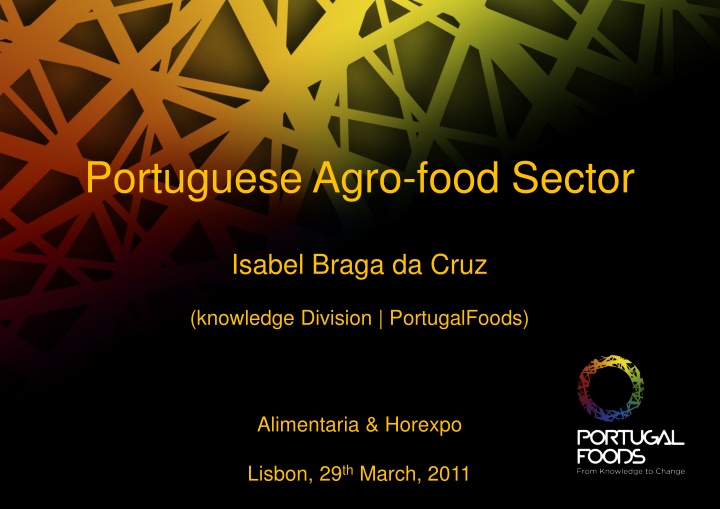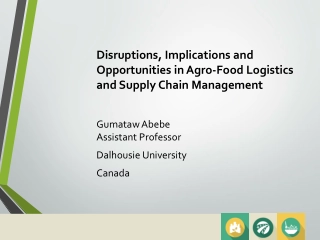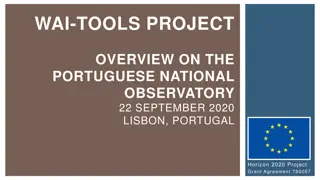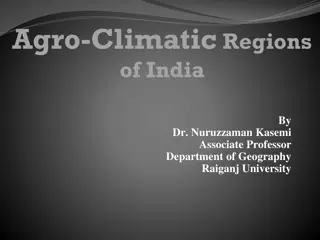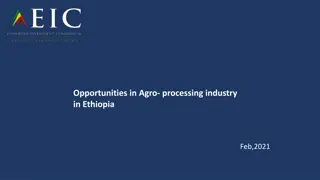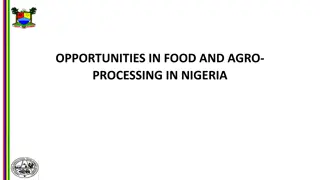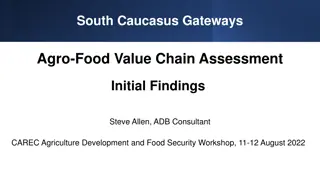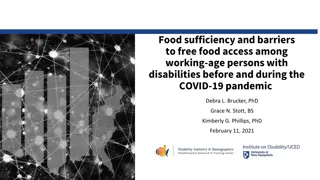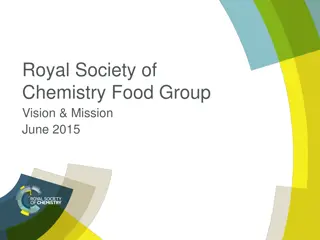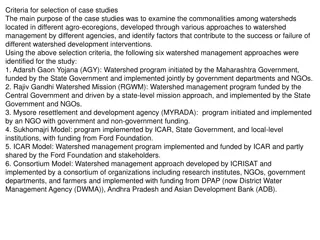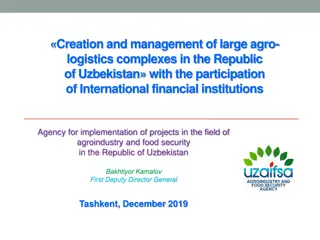Portuguese Agro-food Sector
Characterization of the agro-food sector in Portugal within the European context, focusing on the major sub-sectors, turnover evolution, and distribution of enterprises and employees. Learn about PortugalFoods Observatory's analysis of food product launches in the Portuguese market and key conclusions drawn.
Download Presentation

Please find below an Image/Link to download the presentation.
The content on the website is provided AS IS for your information and personal use only. It may not be sold, licensed, or shared on other websites without obtaining consent from the author.If you encounter any issues during the download, it is possible that the publisher has removed the file from their server.
You are allowed to download the files provided on this website for personal or commercial use, subject to the condition that they are used lawfully. All files are the property of their respective owners.
The content on the website is provided AS IS for your information and personal use only. It may not be sold, licensed, or shared on other websites without obtaining consent from the author.
E N D
Presentation Transcript
Portuguese Agro-food Sector Isabel Braga da Cruz (knowledge Division | PortugalFoods) Alimentaria & Horexpo Lisbon, 29th March, 2011
Outline: Characterisation of Agro-food sector in Portugal over an European context; PortugalFoods Observatory (example) analysis of food product launches in the Portuguese market; Conclusions
General context: Agro-Food Sector in Europe EU Food and Drink industry (2008) * Source: CIAA
General context: Agro-food sector in Portugal Agro-food sector is the biggest industrial sector in Portugal, as well as in Europe; Portuguese Agro-food sector corresponds to 16% of the total transformation industry in Portugal; Portuguese Agro-food sector is mostly composed by SME s, highly dispersed; Major food production is focused on a reduced number of enterprises. It represents a turnover of 13.500 M (2009); It contributes to 7,6% to GNP. Total number of enterprises in food field ranges 11.000; Total number of employees in food field ca. 111.000 Source: FIPA, based on INE data
General context: Agro-food sector in Portugal Turnover evolution* 13.500 M Turn-over (M ) year Source: FIPA projections for 2008 and 2009, INE data (2003 to 2007)
General context: Agro-food sector in Portugal Relative weight of the different sub-sectors to the turnover (2009)* PT: Beverages, Meat, and Dairy and the major sub-sectors representing 44% of total turnover EU: Beverages, Meat, and Dairy and the major sub-sectors representing 50% of total turnover * Source: FIPA, based on INE data
General context: Agro-food sector in Portugal Distribution (%) of the enterprises by sub-sector PT: Beverages, meat, oil & fats and dairy Source: FIPA, based on INE data
General context: Agro-food sector in Portugal Employee distribution, relative weight of the different sub-sectors. Source: FIPA, based on INE data
General context: Agro-food sector in Portugal Great majority of the enterprises are of small dimension: 80% of the enterprises has less than 9 employees, representing 9% of total turnover; Highest contribution to turnover (21%) comes from enterprises with a number of employees (10-49); Only 2,8% of the enterprises has more than 50 employees. Source: FIPA, based on INE data
General context: Agro-food sector in Portugal Import & Export Agro-food products represent ca. 12% of the total importation in Portugal (6.000 M in 2007); Spain and Germany are the biggest players in EU; Source: FIPA, based on INE data
General context: Agro-food sector in Portugal R&D investment Agro-food sector traditionally has a reduced investment in R&D, when comparing with other production sectors; R&D investment in Portugal represents 1,2% of GNP; Despite the low investment on R&D, a high intensity and activity on innovation is evident, specially connected with differentiation of food products and processes, according to market trends and consumer demands. Source: FIPA, based on INE data
General context: Agro-Food Sector in Portugal Over the last decade Portuguese Agro-food sector has been learning how to value their uniqueness towards innovation, reacting to the new challenges of the global market and consumer demands. How? Over important changes on production units (evolving environment concerns and sustainability issues); By introducing Quality and Safety on their products, through HACCP and several certification processes; By improving communication with consumer (through marketing and label information).
Observatory approach Food products in Portugal
Outline Global analysis of new food products launched in Portugal (tracked by the Innovadatabase); Five years period of analysis: 2006 2010; Food products detected: 5.111 (products found); Market Analysis: Product Launch Activity Positioning Analysis - Stand-outs & Product Trends
Product Launch activity in Portugal Distribution analysis over the last 5 years, reveals a strong increase in food product launches beyond 2007; Slight increase between 2007-2010.
Product Launch activity Company (Top 10 ) % Retailer (Top 10 ) % LIDL 16,1 CONTINENTE 23,6 MODELO CONTINENTE HIPERMERCADOS 4,7 LIDL 18,4 NESTL 4,1 HYPERMARKET 12,8 KRAFT 2,4 JUMBO 7,2 DANONE 2,3 MODELO SUPERMARKET 4,1 UNILEVER 2,2 PINGO DOCE 3,3 JOAQUIM MOREIRA PINTO & FILHOS 1,6 CARREFOUR 2,8 PINGO DOCE 1,5 ALI SUPER 1,5 CARREFOUR 1,4 Hypermarket JUMBO 0,8 BIOREGIME 1,3 MODELO CONTINENTE HIPERMERCADOS 0,8
Market analysis Market distribution (top 15)
Market analysis Market category (top 10)
Market analysis Positioning
Conclusions: agro-food sector in Portugal Quality and Safety in parallel with certification, are the basis of whole agro-food scenario; Major trends in food sector, show that consumer demands healthier products, more convenient and of easy preparation; Nowadays is stated that food is seen a new cultural approach, leading to new experiences and learning, beyond the inherent nutrition of food, leading to high opportunities of differentiation in food market and business.
Dziki! Isabel.bcruz@portugalfoods.org Alimentaria & Horexpo Lisbon, 29th March, 2011
